TOP STORY - Announcing Upcoming 12th International Meeting
12th International Meeting on Neuroacanthocytosis Syndromes, Cohen Syndrome, and VPS13-related Disorders
by Despina Dinca & Joy Willard-Williford
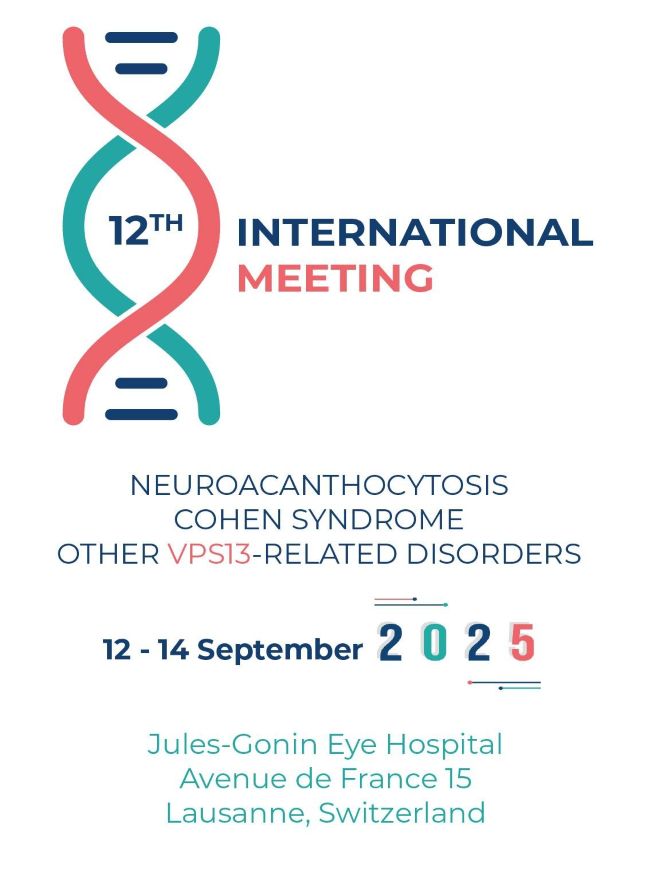
Thank you for reading this 48th edition of NA News. Inside this issue you will find information about the upcoming 12th International Meeting of Neuroacanthocytosis, Cohen Syndrome, and other VPS13-related diseases, the latest news on research from Italy and New York, and a story on a recent Q&A forum for patients and their families. There is news regarding a recent gathering of patients with XK disease, a report on a recent NBIA symposium, the future for The Advocacy, and a special article on the importance students play in raising awareness of NA diseases. Read on and enjoy...
You’re invited! Join us in Lausanne, Switzerland, 12–14 September 2025 for the12th International Meeting on Neuroacanthocytosis Syndromes, Cohen Syndrome, and VPS13-related Disorders.
This global event brings together researchers, clinicians, patients, families and carers to:
- Share the latest scientific research
- Learn more about living with VPS13A and XK diseases
- Connect with others in the NA community
Venue: Jules-Gonin Eye Hospital, Lausanne
Full programme & registration: https://events.ophtalmique.ch/evenement/vps13-meeting/
More details (English, Deutsch, Español) updated regularly: https://naadvocacy.org/12th-international-meeting-for.../
Everyone is welcome, whether you’re a patient, family member, researcher or supporter. Let’s move research and care forward, together.
|
 |  |
21st VPS13 Forum: Putting Your Questions First
Once a year the VPS13 Forum takes a different format and the patients, their families and carers take the centre stage.
by Despina Dinca
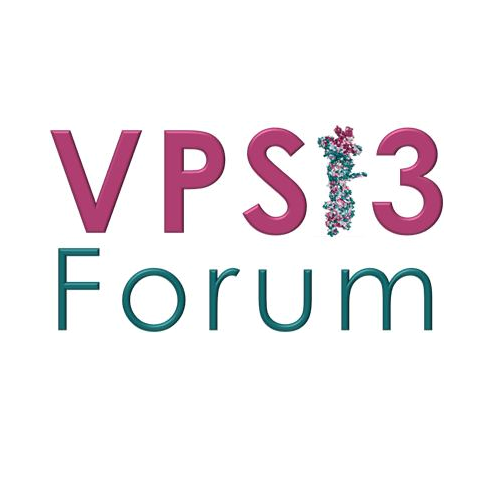
Instead of scientific talks, the 21st VPS13 Forum, held on 28 April 2025 focused entirely on questions submitted by people living with VPS13A and XK diseases, their families, and carers.
We had an absolute record number of questions (and topics) sent in!
The Forum was moderated by Professor Ruth Walker (Mount Sinai, New York) and featured a panel of experts:
- Dr Julie Kerner – drug developer and NA Advocacy USA board member
- Dr Elina Tripoliti – speech and language therapist, University College London
- Dr Alzbeta Mühlbäck – psychiatrist, Klinikum Taufkirchen, Germany.
Together, they provided practical insights, research updates, and helpful tips on topics including:
- genetic testing and counselling
- swallowing, speech, and dystonia therapies
- cognitive and behavioural symptoms
- nutrition and digestive concerns
- non-traditional therapies like EMST and CBD
- research progress, from mouse models to AI and clinical trials.
Highlights included advice on managing injections, speech exercises (jam on the palate, anyone?), and tools like the EMST150 for strengthening muscles used in swallowing and speaking. Don’t know what we’re on about? Check out the full report (pdf format) which explain all the acronyms and medical terms!
The discussion also shed light on emotional wellbeing, executive functioning, and the benefits and challenges of collecting long-term patient data to guide research.
Looking ahead, the 12th International Meeting on Neuroacanthocytosis Syndromes, Cohen Syndrome and VPS13-related disorders will be held between 12 and 14 September 2025 in Lausanne, Switzerland. You can read more information here. We hope to see you there!
And of course, see you at the 22nd VPS13 Forum on 28 July 2025 from 13:00 BST (GMT+1 or check your local time). The topic is “Novel functions of VPS13 and XK proteins” and there will be lots of scientific presentations.
If you can’t attend or looking to read a simpler version of the meeting, we’ll publish the report as soon as possible after the meeting. Find past reports in our archive: naadvocacy.org/research-forum/ Please like and share our social media posts about these, it helps us enormously to spread the word far and wide!
Thank you to everyone who sent in questions and joined us for this deeply engaging session. Forums like these show the strength and heart of our community, and remind us why we keep searching for clues to a cure.
 |  |
Research We Fund!
New research sheds light on muscle weakness in VPS13A disease
by Professor Lucia De Franceschi & Despina Dinca
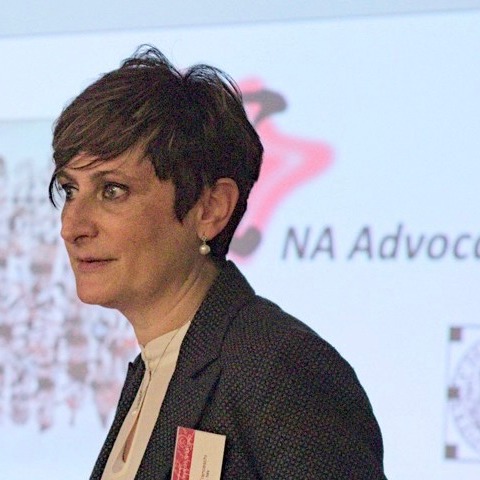
Back in February, we shared a behind-the-scenes look at an important research project from Professor Lucia De Franceschi’s lab at the University of Verona. Her team has been investigating how VPS13A disease (also known as chorea-acanthocytosis) may contribute to early-onset muscle weakness — a symptom experienced by many patients, yet still poorly understood.
We’re now delighted to share that this work has been published in Acta Neuropathologica Communications. The findings offer valuable insight into the disease process — and even a glimmer of hope for future treatments.
What did they discover?
Using a specially developed VPS13A disease mouse model, the research team found that muscles without the VPS13A gene show signs of stress, inflammation, and difficulty clearing waste proteins — changes that closely resemble early muscle aging. The affected muscle cells also had trouble maintaining energy and overall health.
This may help explain why some people with VPS13A disease begin to experience muscle weakness at an early stage, even before more classic neurological symptoms appear.
And there’s more good news...
When the team treated the mice with rapamycin (a drug already approved for use in other settings), they observed a partial restoration of muscle cell health, a promising early step that may help guide future therapeutic development.
The study was led by Professor De Franceschi (pictured, far right) and first authored by Veronica Riccardi (third from the right).
We’re proud to say that this research was supported in part by Advocacy for Neuroacanthocytosis Patients and NA Advocacy USA, which funded the maintenance of the VPS13A disease mouse model used in the study.
Read the full paper here: actaneurocomms.biomedcentral.com/articles/10.1186/s40478-025-00569-8.
Thank you to the research team in Verona and to everyone who supports our work, your donations make it possible to fund studies like this, which bring us one step closer to understanding (and eventually treating) our ultra-rare conditions.
 |  |
More Research We Fund!
XK Disease Brain Lipid Study: Understanding Changes in Brain Fats Linked to XK Disease
by Ruth Walker
Ruth Walker sends this update on research being conducted at the Icahn School of Medicine at Mount Sinai in NYC.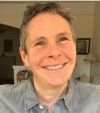
Our team, led by Dr. Gabriel Miltenberger-Miltenyi from the University of Lisbon, Portugal, and Drs. Claudia Laborc and Ruth Walker from the Mount Sinai School of Medicine, New York City, USA, has been carrying out a parallel study in XK to that we did previously in VPS13A disease.
We looked at donated brain tissue from people with XK disease and compared it to tissues from people without the disease. Our goal was to examine the types and amounts of fats (lipids) in different parts of the brain.
We found that people with XK disease had unusual amounts of certain brain lipids. Some types of fats were higher than normal in some brain regions, while others were lower. These changes were not the same in every part of the brain; some of them were similar to those we found in VPS13A disease, while others were not. The results suggest that XK disease affects how the brain processes and uses fats, which could be related to how the disease damages nerve cells.
This study gives new evidence that problems with lipid metabolism in the brain are linked to XK disease and might play a role in the loss of brain cells seen in this condition. We look forward to presenting our findings at the upcoming meeting in Lausanne, Switzerland, in September, and discussing their significance with our colleagues in the field.
This project was similarly supported by a generous grant from NA Advocacy USA and The Advocacy for NA Patients, and we are grateful to them and to all patients and family members who made this work possible.
[Pictured below: Dr. John Crary of the Icahn School of Medicine at Mount Sinai's Neuropathology Brain Bank and Research CoRE and researcher Dr. Claudia Laborc.]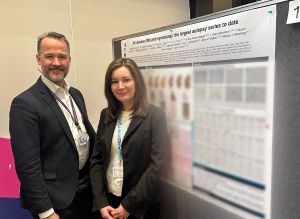
 |  |
An E-gathering of XK Patients
XK Patients and Family Members Recently Met via Zoom
by Joy Willard-Williford
Joy Willard-Williford shares news of a recent online gathering of XK patients and their loved ones.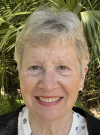
On Sunday afternoon, June 22, a group of XK patients and their loved ones, met via Zoom for an informal “get-to-know-you” and to share disease-related issues. All eight patients were US-based, save for a gentleman who joined from Iceland. Several patients were joined by spouses, partners, or parents. Everyone found it a positive experience, and a helpful reminder that we are not alone. In one instance, an XK carrier discovered that she lived in the same town as the parents of an XK patient! Several agreed to share contact information, and an XK Facebook support group was launched as a direct result of input from those gathered.
Another Zoom gathering of XK patients and their loved ones is tentatively planned for late September. If you are an XK patient and would like to be informed of this opportunity to meet others with your same disease, please contact Joy Willard-Williford at joy@naadvocacyusa.org and she will make sure you get a formal invitation. We meet at 2pm EST, but we welcome other XK patients from around the world.
If you are interested in joining the private Facebook XK Support Group, you can find us at https://www.facebook.com/groups/929157575991261. Of course you must be on Facebook to join the group.
Finally, this effort came about organically, beginning with a Zoom chat between an XK caregiver and an XK patient and his wife. That conversation was so helpful that it was decided to expand it to others. We are wondering if patients with VPS13A and their families might be desirous of a similar opportunity to network via Zoom. If you are interested, please contact Joy at joy@naadvocacyusa.org and we will work towards that goal if there is sufficient interest.
 |  |
Symposium on NBIA
Renewed relationship with the neuroacanthocytosis field
by Professor Emeritus Adrian Danek
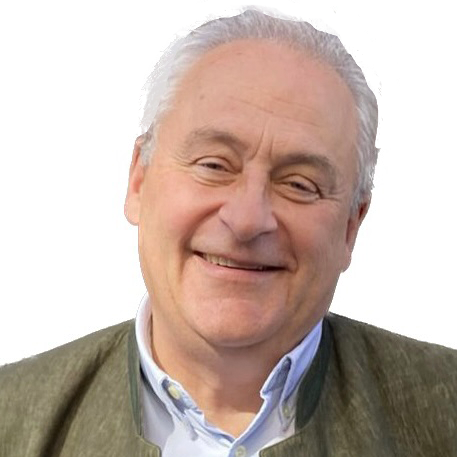 Neurodegeneration with Brain Iron Accumulation (NBIA) denotes a heterogeneous group of conditions, among them PKAN (Pantothenate Kinase associated Neurodegeneration). Patient blood may also show increased numbers of acanthocytes and PKAN may thus be considered a type of neuroacanthocytosis (NA). Neurodegeneration with Brain Iron Accumulation (NBIA) denotes a heterogeneous group of conditions, among them PKAN (Pantothenate Kinase associated Neurodegeneration). Patient blood may also show increased numbers of acanthocytes and PKAN may thus be considered a type of neuroacanthocytosis (NA).
A decade ago, there was hope that comparative studies of NBIA and NA syndromes might advance both fields and three joint NA-NBIA symposia were held in collaboration with the respective patient and scientific communities: in Bethesda, MD, USA (2011), in Ede, The Netherlands (2013) and in Stresa, Italy (2015).
Progress in NBIA, however, developed much quicker than in NA and a considerable number of NBIA subtypes and mechanisms were since discovered: holding symposia together was not felt useful for a time. Nevertheless, contacts were maintained and among the colleagues involved were Zuhal Yapici (Istanbul, Turkey) and Thomas Klopstock (Munich, Germany). They invited Professor Emeritus Adrian Danek, professor of neurology at Munich University and also trustee of the NA Advocacy, as guest of honour to the 9th International Symposium on NBIA.
The topic he presented was "From eponyms to mechanisms: a century of NBIA research" and of course touched upon the NA-NBIA relationship, but also detailed the unethical behaviour later shown by Hallervorden and Spatz (during WWII they obtained research brain specimens through unethical ways; this led to the renaming of the condition to dissociate it from their actions) who had first delineated an NBIA condition. Actually, "NBIA" was coined to avoid the original eponymic designation. The subsequent talks and poster presentations at the three day meeting in Istanbul covered the great variety of heterogeneous NBIA conditions that are known today and raised some hope for causal treatment in a few of them.
As a practical outcome a new collaboration was formed between the Munich group and Dr Lars Kaestner, host of the 11th International Symposium held in 2023 in Homburg, Germany. Systematic studies of the presence of deformed red blood cells, e.g. acanthocytes, will be performed in patients affected by NBIA syndromes that are regularly examined by Professor Klopstock´s Tircon consortium. These studies aim to better characterize the role that acanthocytes may play in PKAN and possibly other NBIA types. This will allow for better comparison with VPS13A and XK disease and might even uncover shared mechanisms, relevant for treatment of the conditions.
 |  |
A New Chapter: Launching Our 2025–28 Strategic Plan
An exciting milestone in the life of NA Advocacy!
by Despina Dinca
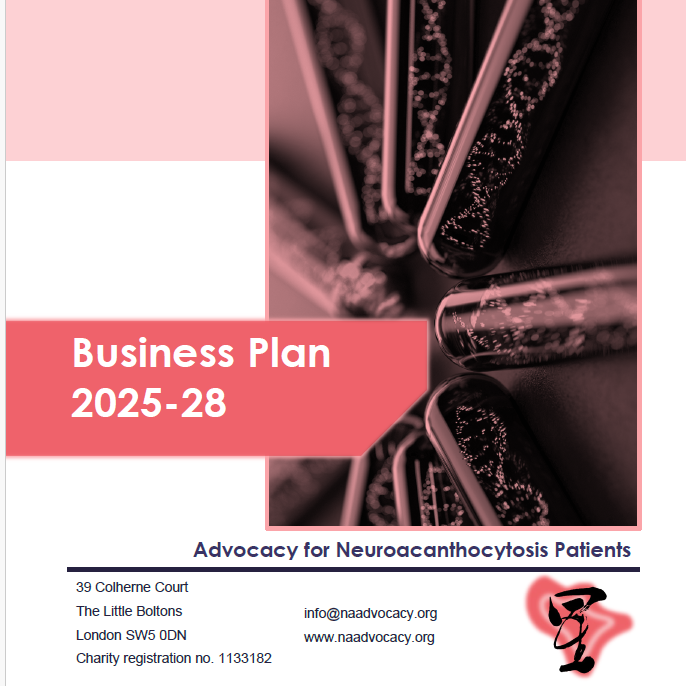
We’re proud to share an exciting milestone in the life of NA Advocacy: the launch of our new 2025–28 Business Plan and supporting strategies
These plans are the result of months of reflection, collaboration, and careful planning, designed to carry our charity forward with purpose, clarity, and resilience. At the heart of all three documents is our enduring mission: to improve the lives of people affected by neuroacanthocytosis (NA) syndromes through awareness, support, and research.
While these have so far been created for NA Advocacy based in London, the work is being extended and adapted to the sister organisation, NA Advocacy USA, to continue to align our ethos and common efforts.
Both organisations envision a future where individuals living with VPS13A or XK disease feel less alone, where earlier diagnosis is possible, and where global collaboration helps accelerate research. To get there, we’ve set out three clear goals for the years ahead:
- Strengthening support for patients, families and carers through direct contact, resources and events
- Raising awareness among clinicians, researchers, and the wider public through strategic outreach and education
- Building capacity to grow our income, create, expand and invest in our programmes.
The plan outlines key programmes, like our ongoing VPS13 Forums, a new patient registry, international symposia, and our continued commitment to funding vital research. We’re also building a more structured fundraising approach, with a focus on regular giving, major donor engagement, and partnerships. And we’re investing in more accessible, inclusive communications to reach people affected by NA wherever they are in the world.
On 2 July, the plans were presented to the Board of Trustees, who responded with their strong support and shared enthusiasm for the direction ahead. Their encouragement reflects what we hope this new strategy communicates to you, too: that we are small, but focused, and determined to do so much more for our community!
We look forward to sharing progress with you as the work unfolds, and we thank you, as ever, for being part of our journey. Whether you’ve shared a story, offered a donation, or simply followed our updates, your support helps keep us moving forward!
 |  |
Growing the Future
Why students matter in rare disease research
by Despina Dinca
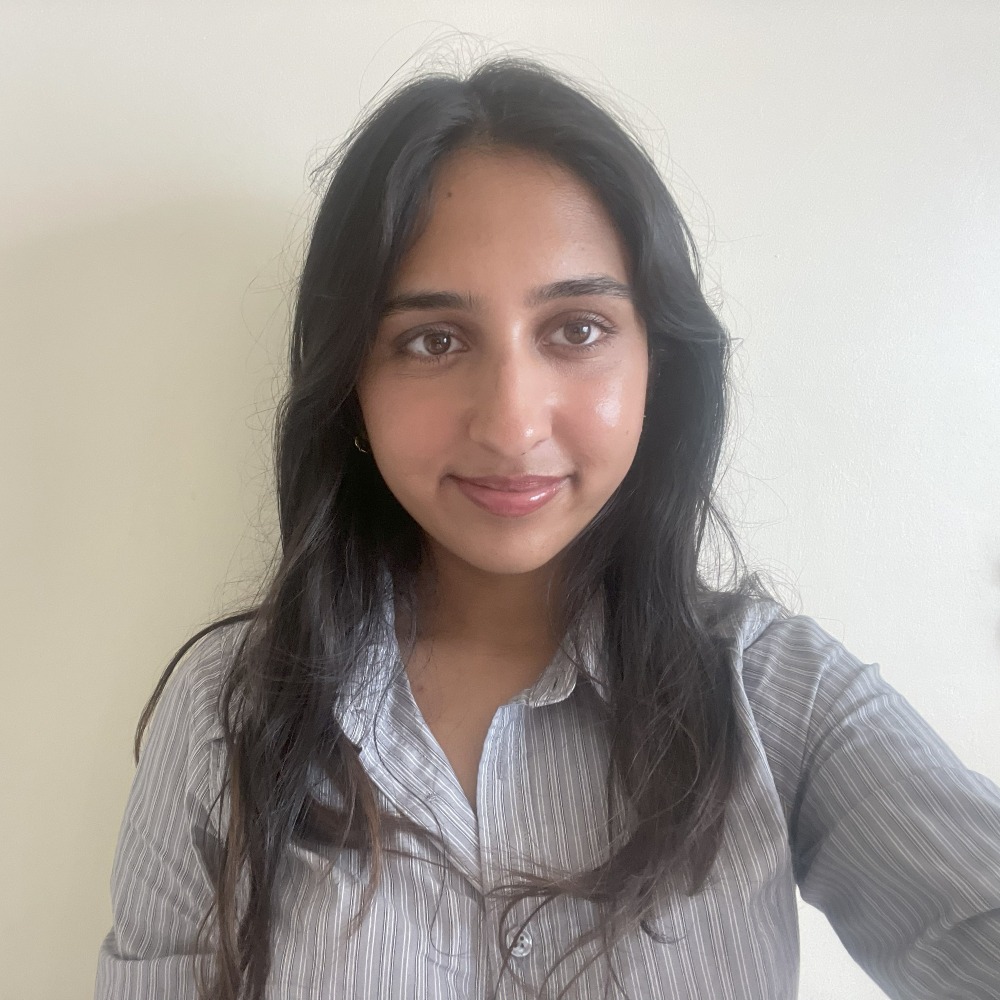
As much as we sometimes focus on the present moment and immediate support for our community, looking towards the future is also very important. We are grateful to the scientists and clinicians who are looking into our conditions and have been with us for a long time, and we are also keen to connect with the next generation interested to take their research further and further.
We offer the Glenn Irvine Prize in honour of our co-founder, to encourage early-career researchers to pursue developments in the neuroacanthocytosis research field.
This year we also took part in the Student Voice Prize organised by Beacon for Rare Diseases and Medics for Rare Diseases, where a charity is paired with a student who has an interest in rare diseases. The students are given three main topics to choose from to match the closest possible to the purpose of the charity they were matched with.
We’re proud to share the work of Amna Ali, the medical student who wrote the essay on Neuroacanthocytosis (NA) syndromes for the competition. Her piece, titled “Rare but Resilient”, explores the risks, hopes and challenges of clinical research into the ultra-rare diseases VPS13A and XK, and how crucial it is to involve young people early in the journey.
Amna spoke with Ginger Irvine, Chair and co-founder of NA Advocacy, and wrote up her insights into a thoughtful exploration of why rare disease research matters, not just for affected families, but for the future of science and medicine more broadly.
Her essay captures some powerful points:
- Raising awareness starts early. When students encounter rare diseases during training, they carry that awareness into their future roles as clinicians, researchers, and leaders.
- Early engagement shapes careers. Exposure to conditions like VPS13A and XK disease can inspire medical students to pursue rare disease work they may never have encountered otherwise.
- Student voices amplify our mission. By writing about NA in national / international competitions, students like Amna help raise our profile in new and unexpected places.
We published Amna’s full essay on our website: https://naadvocacy.org/rare-but-resilient-by-amna-ali, and we hope it inspires many more students to get curious, get involved, and help push the science forward!
Supporting students is one more way we keep searching for clues to a cure, and we couldn’t do it without your help. If you’d like to support us, consider share this story with someone who might be inspired to learn more.
 |
|
|
|